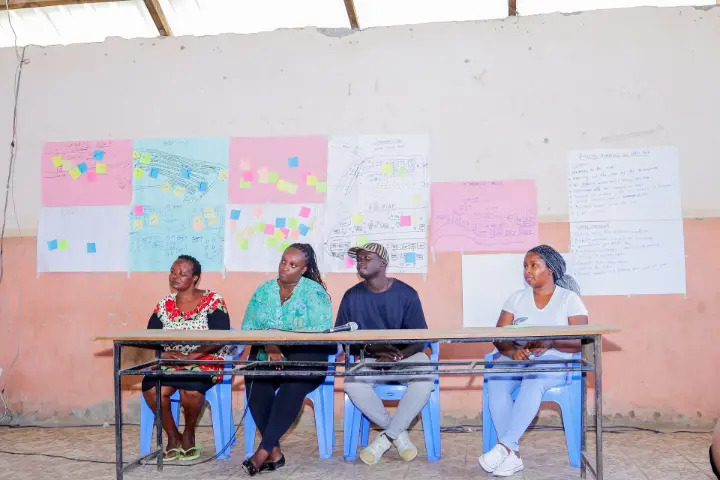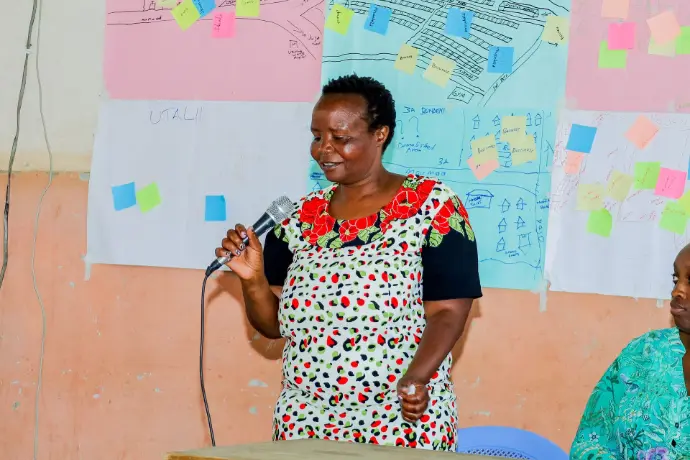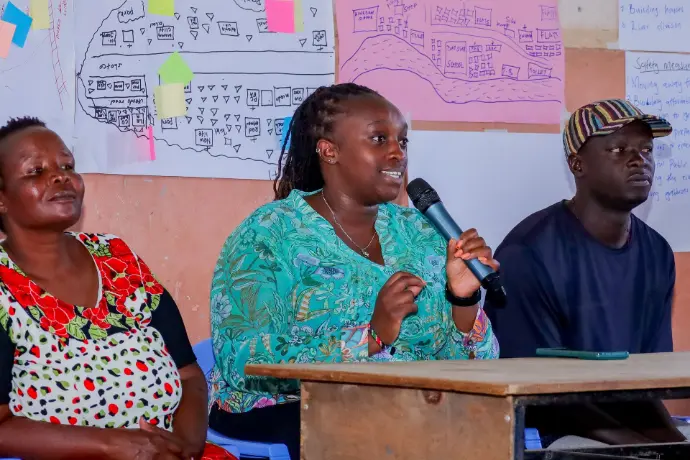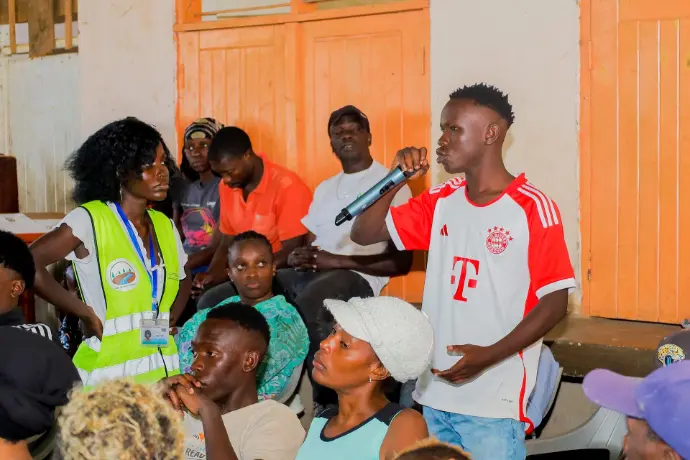Mathare Community Awareness Town Hall Meeting on Understanding Flood Risks was organized on February 14th 2025 at the Undugu polytechnic in Mabatini ward with the perspective of identifying solutions to the increasing flood-related issues for the residents. The meeting provided a platform for discussing the causes of floods, preparedness, and community-level solutions for flood resilience. The session was attended by community members, local leaders, and experts from the government with the purpose of enhancing a collective effort in flood risk management.
Prior to this joint session, the wards concerned—Mlango Kubwa, Hospital Ward, Mabatini, and Utalii Ward—had each conducted their respective dialogue sessions in which they deliberated on flood issues and proposed localized solutions. This final activity was intended to consolidate the knowledge emerging from the previous discussions and formulate a common action plan for flood resilience in Mathare.
The objective of the discussion was to raise awareness on flood risk, causes, and impacts in Mathare, discuss flood safety and emergency preparedness, engage individuals through experiences and stories, and rally collective action and community-owned solutions for reducing flood risks. By bringing together different wards, the session sought to identify common ground and a united voice towards confronting shared challenges.

Panelists during the community Townhall meeting
Key Discussion Outcomes
During the town hall meetings in Mathare, community members voiced several key issues contributing to the area's heightened flood exposure.
Why Mathare is More Vulnerable to Floods
The community members agreed that Mathare's flood susceptibility can be attributed to several factors:
- Proximity to Mathare River: The community is situated near the river, which often overflows during heavy rains, leading to frequent flooding.
- Poor Drainage Infrastructure: Many areas in Mathare lack functional drainage systems, causing water stagnation and severe flooding. The absence of proper maintenance exacerbates this issue.
- Low-Quality Building Materials: Many houses are constructed with substandard materials, making them more susceptible to damage during floods.
- Poor Government Coordination: Inefficient coordination among government bodies results in inadequate flood management and delayed response efforts.
- Low Community Engagement and Public Participation: The lack of active involvement from the community in flood management initiatives weakens the overall response and preparedness.
- Low Economic Standards: The community's economic challenges hinder their ability to invest in flood mitigation measures and recovery efforts.
Waste Management Issues
Uncollected garbage often clogs drainage systems, worsening flooding during rainy seasons. Despite proposals from Nairobi County to address waste management, community engagement remains essential for these solutions to be sustainable. Residents highlighted the urgent need for collective action to ensure proper waste disposal and drainage maintenance.
Poor Public Engagement
Many government-led developments and flood management interventions lack active involvement from the affected communities. Citizens emphasized that meaningful engagement with decision-makers is crucial in formulating effective solutions. Ensuring that community voices are heard and considered in decision-making processes can lead to more effective and lasting flood mitigation strategies.
Inadequate Drainage Systems
Much of Mathare suffers from non-functional drainage systems, leading to water stagnation and severe flooding. The lack of maintenance further worsens the situation. There is a critical need to invest in the development and upkeep of proper drainage infrastructure to prevent recurring floods.
Ineffective Flood Preparedness Mechanisms
The absence of structured emergency response mechanisms causes confusion and delays during evacuation and relief operations. Community members pointed out the necessity of having well-organized response plans to handle flood emergencies efficiently.
Health & Sanitation Risks
Floodwaters often become contaminated, posing severe health risks, including waterborne diseases like cholera and typhoid. Members from Mlango Kubwa and Mabatini wards raised their concerns on lack of proper sanitation facilities including toilets and bathrooms. Immediate intervention is required to enhance sanitation facilities and protect the health of residents.
Economic Disruptions
Frequent flooding has led to significant financial losses for small business owners, impacting livelihoods and the local economy. Addressing the economic repercussions of flooding is vital for the community's resilience and recovery.




Outcomes
Following these discussions, several positive outcomes were achieved:
- Enhanced Community Awareness: Residents gained firsthand knowledge about flood risks, early warning signs, and preparedness measures, which will enable them to respond more effectively to future floods.
- Commitment to Waste Management Improvement: Community members acknowledged the importance of community-based waste disposal programs and committed to working with the county government of Nairobi
- Identification of Key Flood-Prone Areas: Through mapping exercises, communities identified high-risk areas that require immediate attention.
- Improved Coordination Between Wards: The forum facilitated better coordination between the wards in attendance, fostering a unified approach to flood mitigation efforts.
- Policy and Infrastructure Enhancement Advocacy: Community representatives pledged to advocate for policy commitments and improved drainage infrastructure from the Nairobi County government and the National Government.
- Education & Capacity Building: Organizing training workshops on flood safety, emergency response, and community resilience mechanisms.

Conclusion
This meeting marked a significant milestone in empowering the Mathare community to better prepare for and reduce the risks associated with flooding. The discussions underscored that building resilience is a shared responsibility that necessitates action from residents, community organizations, and government stakeholders alike. Moving forward, teamwork and sustained engagement will be crucial in upholding the commitments made during the session, ultimately leading to long-term flood resilience for the Mathare community.
Prepared by: © Mto Wangu Initiative, Feb 2025